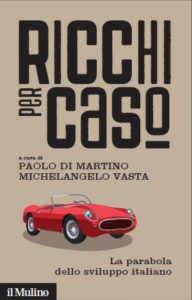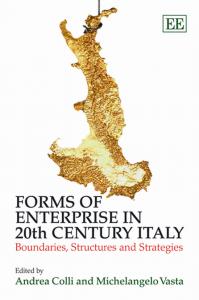Ricchi per caso. La parabola dello sviluppo economico italiano (eds), Bologna, il Mulino, 2017, [with P. Di Martino]

Summary
Nel secolo e mezzo trascorso dall’Unificazione, l’Italia ha raggiunto livelli di ricchezza simili a quelli dei maggiori paesi industrializzati. L’ondata di globalizzazione degli ultimi decenni ha però fatto emergere tutta la debolezza del sistema produttivo italiano. Secondo l’originale lettura che ne danno gli autori di questo libro, il capitalismo italiano è stato negativamente influenzato da istituzioni inefficienti, che hanno avuto un forte impatto sulle dimensioni e sulla governance delle imprese, come anche sulla formazione di capitale umano e sulla capacità innovativa. L’assetto istituzionale ha quindi rappresentato il principale freno per le potenzialità di sviluppo del paese.
Forms of Enterprise in the 20th Century Italy. Boundaries, Structures and Strategies (eds), Cheltenham, Elgar Publishing, 2010, [with A. Colli]
Summary
Taking an historical perspective, this unique book highlights the evolution of the many diverse forms of business enterprise, and discusses the contribution of these different types of firm to the economic growth of Italy.
One important issue that has recently captured the attention and the research efforts of both economists and economic historians has been the debate on varieties of capitalism in the modern world. In this context, the expert contributors analyze the various stages of Italian development that have been characterized by diverse dominating forms of enterprise which, in turn, have adapted to the nature of technological and market opportunities at the institutional, national and international level. This book proposes a new interpretation of the ‘Italian case’ that utilizes both the structural and macroeconomic perspective of comparative history, as well as the microeconomic perspectives focusing on the strategies of different economic agents.
Based on solid quantitative evidence, this original work will prove to be a valuable resource for academics and students of strategy and organization, economic historians and applied economists.
Evolution of Italian Enterprises in the 20th Century (eds), Heidelberg-New York, Physica-Verlag (Springer), 2006, [with R. Giannetti]
Summary
During the first two-thirds of the 20th century the themes of sectorial structure and compared performance prevail in Italian economic historiography. In the last part of the century, in contrast, attention is focused on the behavior of single economic actors and their micro-economic strategies. This book intends to act as a bridge between the two approaches, and reconstructs – through an original study based on a plurality of methodologies – the secular journey of Italian industrial enterprise, concentrating on the main themes that have characterized the historical and economic debate in the course of time: structural changes and economic growth relative to the succession of “technological regimes”, the comparison on an international scale, large and small enterprise, the organizational structure of ownership and control, the characteristics of entrepreneurs and managers and their strategies.



